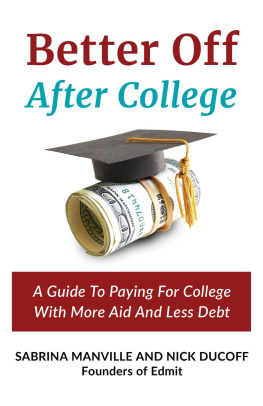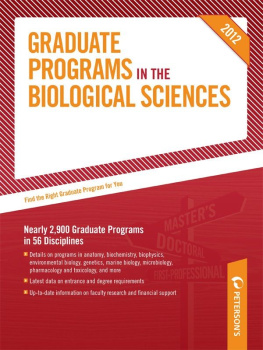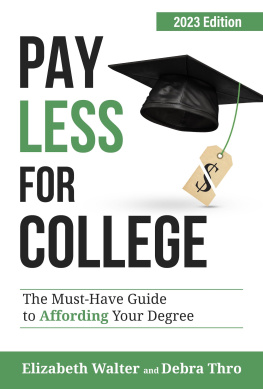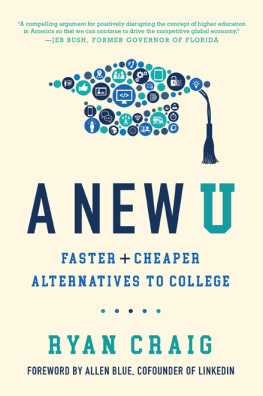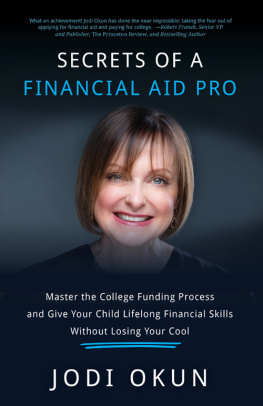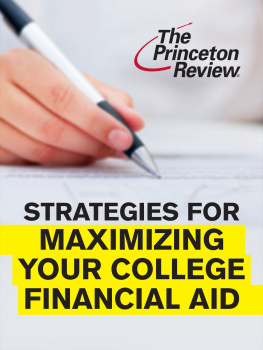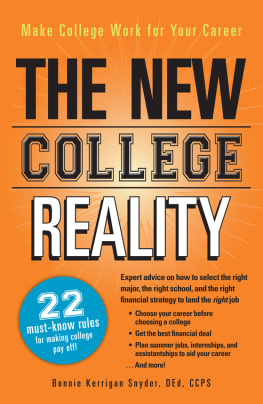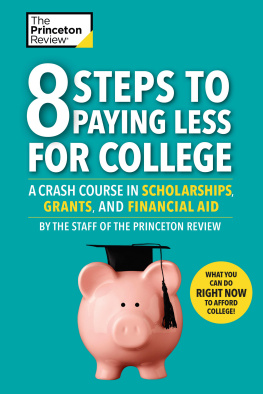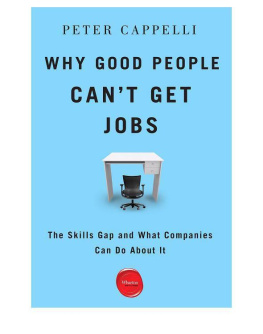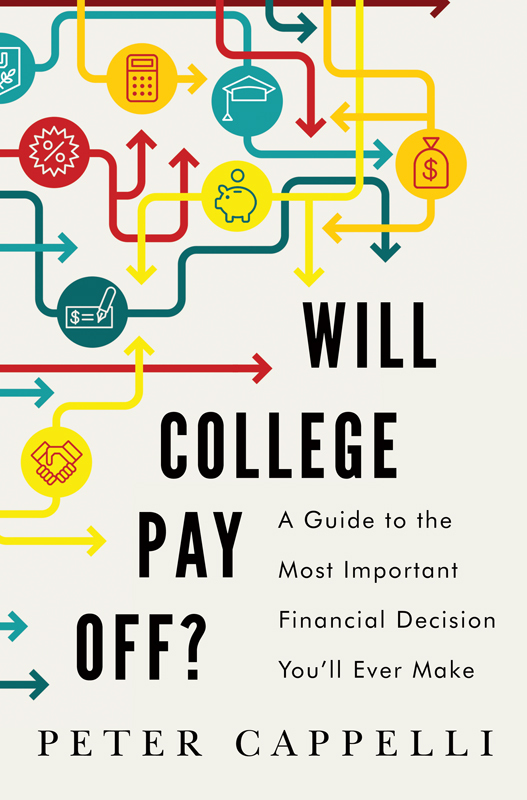WILL COLLEGE
PAY OFF?
WILL COLLEGE
PAY OFF?

A Guide to the Most Important Financial Decision You Will Ever Make
Peter Cappelli

Copyright 2015 by Peter Cappelli.
Published in the United States by PublicAffairs, a Member of the Perseus Books Group
All rights reserved.
Printed in the United States of America.
No part of this book may be reproduced in any manner whatsoever without written permission except in the case of brief quotations embodied in critical articles and reviews. For information, address PublicAffairs, 250 West 57th Street, 15th Floor, New York, NY 10107.
PublicAffairs books are available at special discounts for bulk purchases in the U.S. by corporations, institutions, and other organizations. For more information, please contact the Special Markets Department at the Perseus Books Group, 2300 Chestnut Street, Suite 200, Philadelphia, PA 19103, call (800) 810-4145, ext. 5000, or e-mail special.markets@perseusbooks.com.
Book Design by George Whipple
Library of Congress Control Number: 2015934542
ISBN 978-1-61039-526-7 (PBK)
ISBN 978-1-61039-527-4 (EB)
First Edition
10 9 8 7 6 5 4 3 2 1
To Virginia
Contents
The Link Between Education and a Good Job
The State of Education in the United States
It Depends
College Myths and College Realities
A FOUR-YEAR college education is one of the most important experiences in adult life. What it looks like today, however, is quite different than what most adults remember from their own experience. It is less likely to be a four-year experience on a campus and more likely to be something spread out over many years, often across different colleges, and frequently delivered in office parks. It costs a lot more than it used to, more than in any other country in the world. Far more students are going to college now, especially those from families with fewer advantages, and they often pay for it by taking out loans, sometimes a lot of loans.
In part because of the costs, the pressure has been on colleges to persuade students and their parents that their students will get good jobs when they graduate. To do that, they have responded with a plethora of degree programs that sound just like job titles, such as international hospitality management, especially at the new and growing for-profit colleges.
At the same time, the message from the media, from the business community, and even from many parts of the government has been that a college degree is more important than ever in order to have a good career. As a result, families feel even more pressure to send their kids to college. This is at a time when more families find those costs to be a serious burden.
For those families, sending their kids to college is a huge investment, and they are making that decision with almost no information as to whether it will pay off or bankrupt them. No one should think that is a good idea. Even the most strident advocates for college education recognize that the experience these days can be wildly different depending on which school and degree program one attends. The graduates of some programs move on to do fabulously well in their careers, although how much of that success is the result of attributes they had even before college is rarely discussed. Graduates of other programs do so poorly afterward that there is no chance they will ever pay off the investment they made to attend these colleges.
We should not kid ourselves about the risks associated with the biggest financial decision many families will ever make. Investments in college fail to pay off because students fail to graduate or when those who do take many years to finish as most now do. They fail when students who graduate with substantial loans cannot earn enough to pay back those loans, many of which come with substantial fees, with interest that compounds the day they are issued, and at interest rates up near the level of car loans. They fail when the good jobs promised by the admissions offices do not materialize. They also may fail even when graduates get a job but when their years on campus were so oriented to job training to get them that first job that they learned nothing that will help them later in the workforce.
Public policy plays a role in these developments. The cutback in funding for public colleges, which most U.S. students attend, pushed the problem of paying for college onto families and continues to do so as the run-up in state college tuition vastly exceeds that of their private school counterparts. The more serious concern going forward may be the effort at state and local governments to make college increasingly vocational, to push students toward degrees that sound like jobs employers are trying to fill.
What is so troubling about this move toward making job training the mission of four-year college programs is that there is no evidence that it works. Employers are certainly interested in what college grads know, but the evidence is striking that what matters most to them are the general abilities and skills that one learns in any serious degree program, including liberal arts. They are least interested in the job-specific knowledge that the new vocational programs are pushing. When students are taking courses in the fine points of healthcare administration, classes that taught more general skills that might be useful over a lifetime, such as logic and problem-solving, are pushed aside.
What prompted me to write this book was the unqualified statements about the big payoff to a college degree that are pushing so many students and their families who cant afford to do so to jump into the deep end of college expenses, taking on debt that they cannot afford for experiences that are unlikely to pay off. While there are lots of guides to tell us whether a particular school suits the temperament of our child, there is almost nothing that helps us decide whether a college experience will lead to financial ruin. That is what I try to offer here, a guide to the factors that determine whether a particular program will pay off.
Along the way, I hope to dispel some of the myths associated with college and the labor market, such as the idea that there is some shortfall of science, technology, engineering, and math or STEM graduates, that college students just wont major in the fields where jobs are, or that jobs today require more education than in the past. I highlight the bigger issues that underlie the payoff from a college degree, such as how much of the success of college grads comes from the ability to identify students who are already very able, how the job market has changed in ways that make work experience rather than education the key factor, and what is happening with K12 education in the United States that has changed the college marketplace.
Many people helped with this project. Larry Liu provided extremely thorough assistance identifying sources, my colleagues Bob Zemsky, Pat Rose, and Peter Eckel read early drafts and offered suggestions as did Stephen Sherret. Special thanks to John Wright for putting the project together and to my editor John Mahaney for helpful guidance along the way.

The Link Between Education and a Good Job


